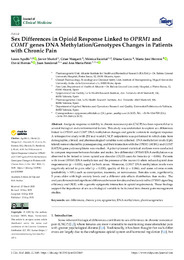Title:
Sex Differences in Opioid Response Linked to OPRM1 and COMT genes DNA Methylation/Genotypes Changes in Patients with Chronic Pain |
Authors:
Agulló, Laura 
Muriel, Javier 
Margarit, César
Escorial, Mónica 
Garcia, Diana
Herrero, María José
Hervás, David
Sandoval, Juan 
Peiró, Ana  |
Editor:
MDPI |
Department:
Departamentos de la UMH::Farmacología, Pediatría y Química Orgánica |
Issue Date:
2023-05-13 |
URI:
https://hdl.handle.net/11000/32349 |
Abstract:
Analgesic-response variability in chronic noncancer pain (CNCP) has been reported due to several biological and environmental factors. This study was undertaken to explore sex differences linked to OPRM1 and COMT DNA methylation changes and genetic variants in analgesic response. A retrospective study with 250 real-world CNCP outpatients was performed in which data from demographic, clinical, and pharmacological variables were collected. DNA methylation levels (CpG island) were evaluated by pyrosequencing, and their interaction with the OPRM1 (A118G) and COMT (G472A) gene polymorphisms was studied. A priori-planned statistical analyses were conducted to compare responses between females and males. Sex-differential OPRM1 DNA methylation was observed to be linked to lower opioid use disorder (OUD) cases for females (p = 0.006). Patients with lower OPRM1 DNA methylation and the presence of the mutant G-allele reduced opioid dose
requirements (p = 0.001), equal for both sexes. Moreover, COMT DNA methylation levels were negatively related to pain relief (p = 0.020), quality of life (p = 0.046), and some adverse events (probability > 90%) such as constipation, insomnia, or nervousness. Females were, significantly, 5 years older with high anxiety levels and a different side-effects distribution than males. The analyses demonstrated significant differences between females and males related to OPRM1 signalling efficiency and OUD, with a genetic–epigenetic interaction in opioid requirements. These findings support the importance of sex as a biological variable to be factored into chronic pain-management studies.
|
Keywords/Subjects:
sex differences
chronic pain
epigenetics
DNA methylation
pharmacogenetics |
Knowledge area:
CDU: Ciencias aplicadas: Medicina: Farmacología. Terapéutica. Toxicología. Radiología |
Type of document:
info:eu-repo/semantics/article |
Access rights:
info:eu-repo/semantics/openAccess |
DOI:
https://doi.org/10.3390/jcm12103449 |
Published in:
Journal of clinical medicine 2023 May 13;12(10):3449 |
Appears in Collections:
Artículos - Farmacología, Pediatría y Química Orgánica
|

.png)
